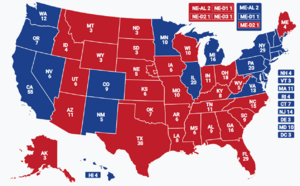2020 United States presidential election (ATB RP)
This article is incomplete because it is pending further input from participants, or it is a work-in-progress by one author. Please comment on this article's talk page to share your input, comments and questions. Note: To contribute to this article, you may need to seek help from the author(s) of this page. |
| |||||||||||||||||||||||||||||
538 members of the Electoral College 270 electoral votes needed to win | |||||||||||||||||||||||||||||
|---|---|---|---|---|---|---|---|---|---|---|---|---|---|---|---|---|---|---|---|---|---|---|---|---|---|---|---|---|---|
| |||||||||||||||||||||||||||||
 | |||||||||||||||||||||||||||||
| |||||||||||||||||||||||||||||
The 2020 United States presidential election was the 59th quadrennial presidential election, held on Tuesday, November 3, 2020. The Democratic ticket of former vice president Robin Diehl and a junior U.S. senator Hamala Karris were defeated by the Republican ticket of Governors Nathaniel Richardson and Laura Dunn. Incumbent President Dick Tawney did not run for re-election to a full term and retired after serving less than a year in office after the death of Republican President Arnold Wolf. The election was marked by low turnout, marked by low enthusiasm for both major party candidates. The main issues were the economic disaster brought on by the collapse of the U.S. Health Insurance Industry over the course of the 2020 recession, police-community relations following the death of Marlon Ward at the hands of an Oklahoma police officer which triggered the Marlon Ward protests against police brutality, and the state of America in the aftermath of the controversial President Arnold Wolf.
The election was the sixth and most recent election in which the winning candidate lost the popular vote. In concurrent congressional elections, Republicans secured a narrow 222-213 majority in the U.S. House and a 50-50 majority in the U.S. Senate, but this was lost following the death of Wisconsin Republican Senator Jon Ronson, resulting in a split government upon inauguration for the first time since Ronald Reagan in 1981. This is the also the first time in U.S. history that a Republican President would take office with a Democratic Senate, George Burke's party would lose the Senate in the middle of his first year in office, but took office with unified control of Washington.